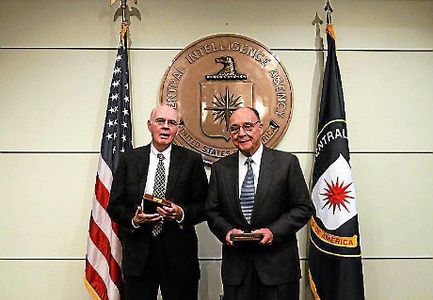Heroic Espionage: Richard Fecteau’s Story and Cold War Conference

Espionage, covert operations, and heroism were at the forefront on September 21, 2023, during the conference titled “Clandestine Operations Against China During the Early Cold War.” The conference was convened by Prof. John Woodward, in his capacity as a Pardee Center Faculty Research Fellow. Delta Phi Epsilon, the BU chapter of the International Business and Foreign Service society provided logistical and operational support. This event, co-sponsored by the Frederick S. Pardee Center for the Study of the Longer-Range Future, the Center for the Study of Asia, and the Kilachand Honors College at Boston University, offered a captivating look into clandestine activities during the early Cold War era. Speakers included BU Prof. June Grasso, a China expert, and Prof. Thomas Christensen of Columbia University who has written about CIA clandestine operations, most recently in his book, Lost in the Cold War.
However, this conference wasn’t solely about historical accounts; it also celebrated a true-life hero, Richard “Dick” Fecteau.
Richard Fecteau, a native of Lynn, MA, and a proud alumnus of Boston University was not just any CIA officer. He held the distinction of being a recipient of the CIA’s highest honor, the Distinguished Intelligence Cross, awarded for his extraordinary acts of heroism. Fecteau’s journey into the world of espionage began shortly after his graduation from BU in 1951 when he joined the CIA as a paramilitary officer. His path quickly intersected with the tumultuous events of the Korean War.
Fecteau’s extraordinary narrative took a dramatic turn on November 29, 1952, when he and his colleague, John Downey, embarked on a perilous mission into Manchuria, China. Their mission: to retrieve an agent dropped into Chinese territory. Tragically, their aircraft was shot down, leading to their capture by Chinese authorities.
Fecteau’s resilience and resourcefulness sustained him during an astonishing 19 years in Chinese prisons, including nine years in solitary confinement. His ingenious tactic of providing the names and character descriptions of his Boston University football teammates to thwart his interrogators became legendary.
In December 1971, Fecteau’s long ordeal took an unexpected turn when he walked unescorted across a border bridge to Hong Kong, marking the end of a harrowing odyssey that had tested his spirit and determination to the limits.
Adding to the recognition of his incredible journey, Richard Fecteau was recently honored with Boston University’s Distinguished Alumni Award. This prestigious accolade acknowledges not only his remarkable contributions but also the indomitable spirit he displayed during his years of service.
The conference, orchestrated by Prof. John Woodward, provided an insightful platform for attendees to delve into the covert world of early Cold War espionage, shedding light on the sacrifices made by individuals like Fecteau. The event featured talks on the Early Cold War, secret missions against China in the 1950s, and an in-depth discussion on Fecteau’s service and sacrifice led by Dr. Nicholas Dujmovic, a retired CIA Deputy Chief Historian.
In the annals of both Boston University’s history and the world of espionage, Richard Fecteau’s story stands as a testament to courage, dedication, and unwavering patriotism.
A video recording of the full conference will be available soon.
Richard Fecteau is also featured in Professor John Woodward’s recent book, Spying: From the Fall of Jericho to the Fall of the Wall, a comprehensive study of the history of intelligence activities from ancient times to the dissolution of the Soviet Union in 1991.
John D. Woodward, Jr. is a former Central Intelligence Agency (CIA) officer. During his twenty-year CIA career, John served as an operations officer in the Clandestine Service and as a technical intelligence officer in the Directorate of Science and Technology, with assignments in Washington D.C., East Asia, Africa, South Asia, and the Middle East. His publications include Biometrics: Identity Assurance in the Information Age (McGraw-Hill, 2003) and Army Biometric Applications: Identifying and Addressing Sociocultural Concerns (RAND, 2001). Read more about Professor Woodward on his faculty profile.